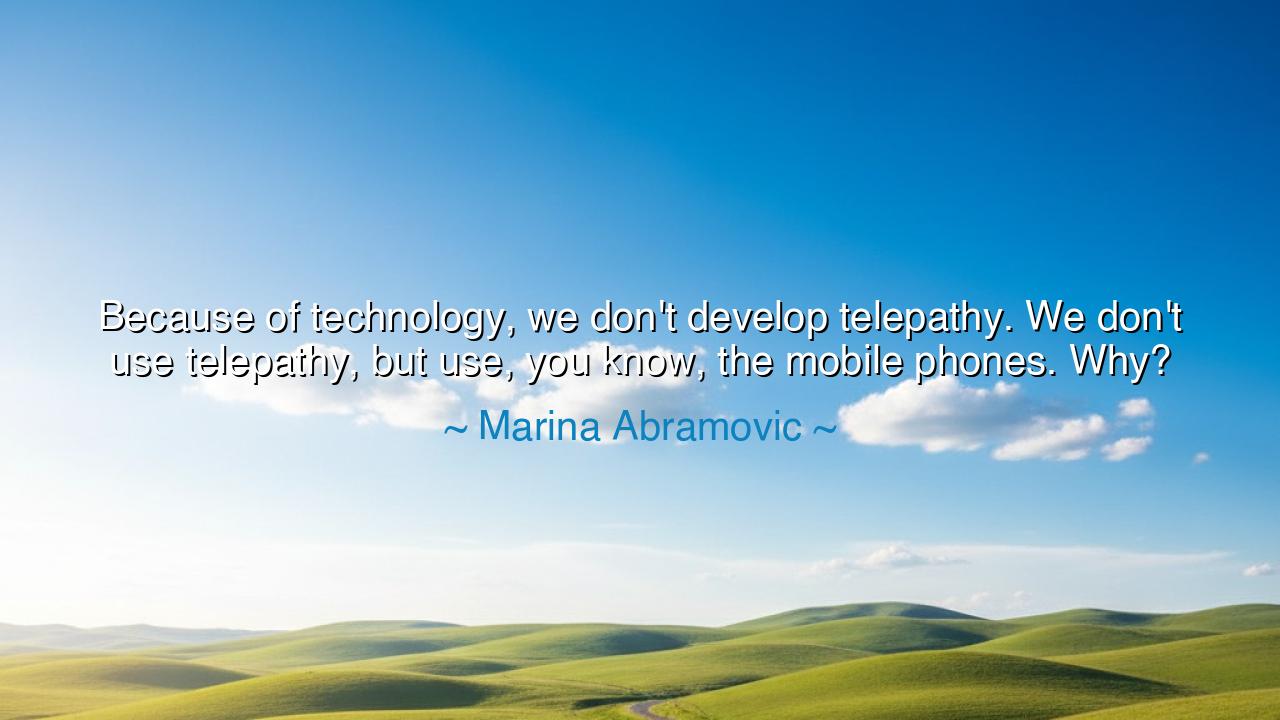
Because of technology, we don't develop telepathy. We don't use
Because of technology, we don't develop telepathy. We don't use telepathy, but use, you know, the mobile phones. Why?






Hear the words of Marina Abramović: “Because of technology, we don’t develop telepathy. We don’t use telepathy, but use, you know, the mobile phones. Why?” In this question, she unveils a lament and a challenge, reminding us that every tool we create gives us power but also takes something away. For in leaning too heavily on machines, humanity risks allowing its inner capacities—its hidden strengths, its silent languages—to wither. She speaks not of telepathy in the literal sense alone, but of the deeper capacity to truly feel and sense one another, heart to heart, without devices standing between us.
In ancient times, before technology wove its wires and screens around the world, people cultivated other forms of knowing. The hunter knew his companion’s thoughts by a glance, the mother sensed her child’s distress before a word was spoken, the sage could discern the mood of a gathering by the faintest shift of breath. This was not magic, but a form of telepathy—the human gift of empathy sharpened by silence, presence, and attention. Abramović’s question—“Why?”—is a cry against the loss of this birthright, drowned in the noise of constant connection through mobile phones, yet devoid of true communion.
History offers many examples of this lost intimacy. The Indigenous peoples of the Americas, for instance, were renowned for their ability to track silently, to communicate without words across long distances, to sense the presence of prey or friend in the unseen woods. Their skill was not born of machines, but of attunement to themselves, to others, to the natural world. It was a kind of lived telepathy, honed by necessity and reverence. Today, that same depth of presence is scattered, for we reach first for devices, as if the machine can speak better for us than our own spirits.
And yet, the mythic tales remind us that humanity has always dreamed of such connection. The twin brothers Castor and Pollux, it was said, could sense each other’s pain across great distances. Many mystics of East and West spoke of the communion of souls, of a silent exchange that bypasses speech. Whether real or symbolic, these stories remind us that deep within, we have always yearned for a form of telepathy—a closeness of being that does not depend on wires, signals, or screens. Abramović warns that by leaning only on technology, we may forget this ancient dream and fail to cultivate what is already within us.
Yet her words are not only a lament—they are also a call to awaken. For technology need not be our jailer if we remember to use it wisely. To develop our own inner sensitivity is still possible, but it requires us to step away from constant distraction, to embrace silence, to truly listen not just with ears, but with spirit. Without this practice, we may know more voices, but fewer hearts; we may send more messages, but touch fewer souls.
The lesson here is clear: do not let mobile phones or any tool replace your humanity. Use them, yes, but do not let them dull your deeper senses. When you sit with a friend, put aside the screen and look into their eyes; you will discover a language older than words. When you walk in the world, notice the gestures, the pauses, the small shifts that reveal what is unspoken. Practice presence until you begin to feel the quiet pulse of connection that flows beneath all conversations. This is the cultivation of inner telepathy—not magic, but the reclaiming of human depth.
Practical wisdom follows: each day, take a moment to be without technology, to be fully alive in silence with another or with yourself. When you feel the urge to check your phone, pause and ask: is there a truth here I could sense without it? Train your spirit as you would a muscle, for presence grows stronger the more it is used. In this way, you restore balance—you embrace the gift of technology without losing the treasure of inner perception.
Thus, Marina Abramović’s words are a warning and a promise. A warning that we may trade away our deepest capacities for the ease of machines. A promise that if we choose, we can cultivate an ancient gift of connection more profound than any signal tower can provide. Let us not ask “why” in despair, but answer “why not” with courage. For though mobile phones may connect us across oceans, it is the silent thread of empathy, the unspoken telepathy of human presence, that will connect us across souls.






AAdministratorAdministrator
Welcome, honored guests. Please leave a comment, we will respond soon